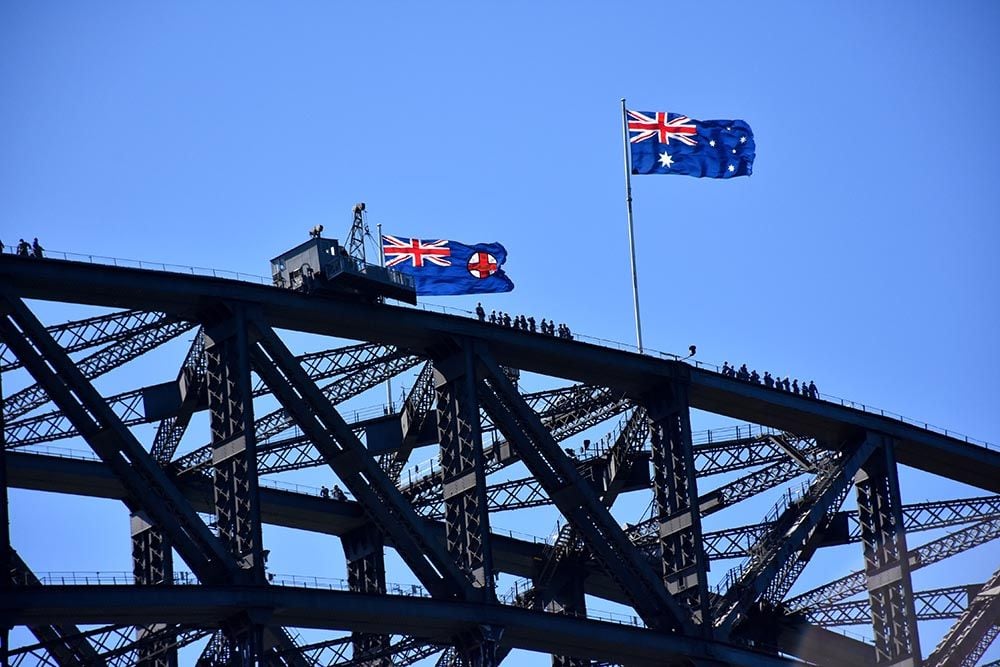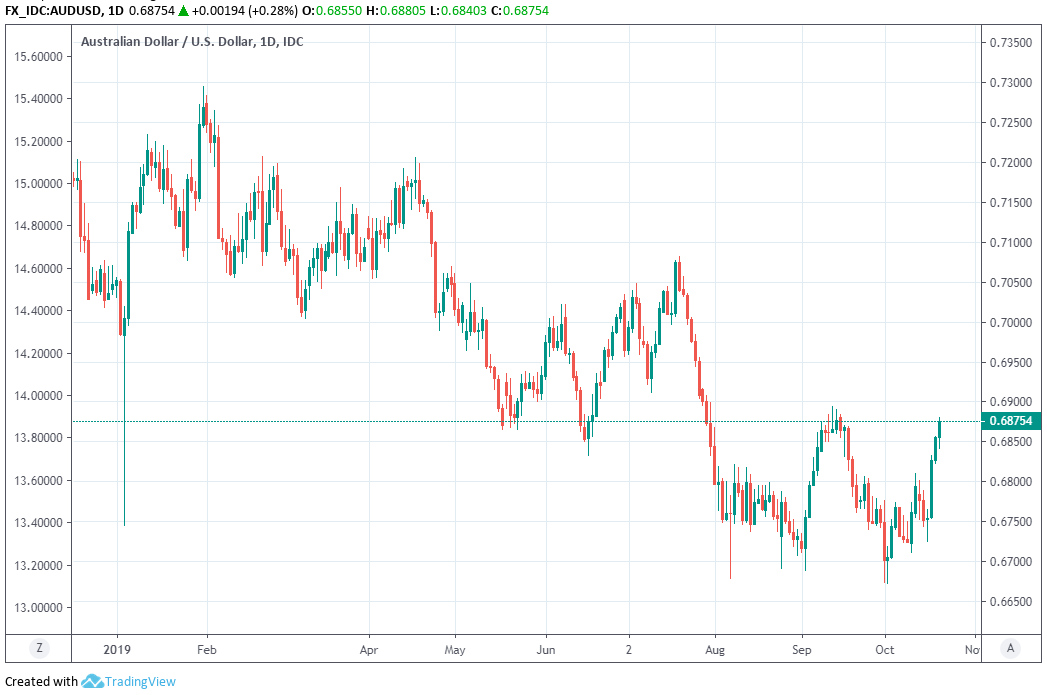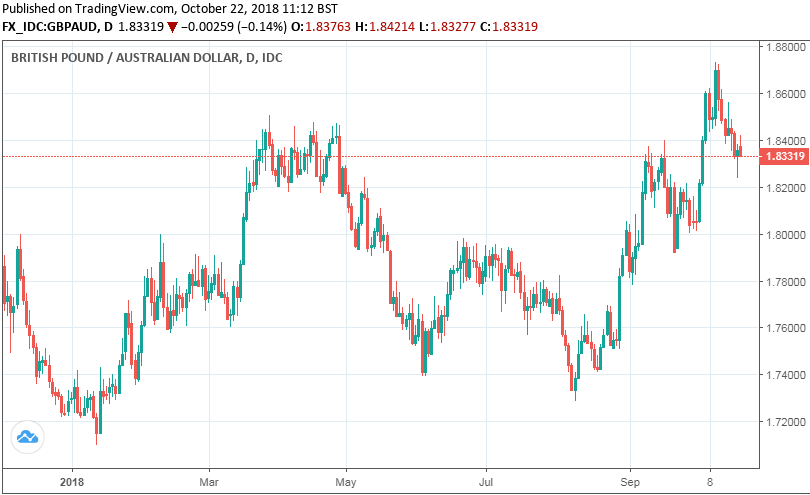HSBC Trader says Australian Dollar a Buy as Markets Mull Potential Political Uncertainty Following Government Defeat in Wentworth
- Written by: James Skinner

Image © Desiree Caplas, Adobe Stock
- AUD weakens following Wentworth election result, U.S. treaty withdrawal.
- Government loses majority, but will limp on to May election say analysts.
- Analysts sanguine on implications, HSBC trader says to buy the Aussie.
The Australian Dollar has endured a soft start to the week after the government lost a one-seat majority in parliament and as the U.S. criticised China's response to efforts at de-escalating the so called trade war between the world's two largest economies.
Australia's ruling coalition lost its majority in the House of Representatives Saturday when voters plumped for independent candidate Kerryn Phelps over the Liberal Party's man David Sharma in the Wentworth by-election.
Wentworth has been vacant since former Prime Minister Malcolm Turnbull resigned after being dethroned in an August leadership challenge.
Domestic politics have had little relevance for the Australian Dollar of later, with global events guiding the currency in 2018 instead. But a looming months-long period of political inertia is hardly a positive development for the Antipodean.
"The Coalition government will need to rely on the support of independents to govern until the federal election due no later than May 2019," says Sean Callow, a currency strategist at Westpac.
If uncertainty over the future policy agenda in Canberra were to deter business investment or hiring decisions over coming months then there could be an impact on the Australian Dollar because it would further delay the point at which the Reserve Bank of Australia (RBA) become willing to raise its interest rate, at least as far as the market is concerned.
Nonetheless, most local analysts are saying it will be May 2019 before a ballot becomes necessary because the Liberal and National Party coalition also has the support of three independent senators. This could mean the Australian Dollar will be unaffected by political uncertainty for a while yet.
"We do not think the by-election result will have a material impact on the currency. With no local data today, eyes will remain on China’s financial markets for a cue on where AUD will start the week. We continue to favour selling rallies," says Daniel Been, head of FX strategy at Australia & New Zealand Banking Group.

Above: AUD/USD rate in 2018.
The AUD/USD rate was quoted at 0.7081 Tuesday but is down 9% for 2018, while the Pound-to-Australian-Dollar rate was 0.15% higher at 1.8357.

Above: Pound-to-Australian-Dollar rate in 2018.
Advertisement
Bank-beating GBP/AUD exchange rates. Get up to 5% more foreign exchange by using a specialist provider to get closer to the real market rate and avoid the gaping spreads charged by your bank when providing currency. Learn more here
Geopolitical Factors Conspire against the Aussie
Monday's by-election result came on a morning when markets were digesting statements made to the FT by White House economic adviser Larry Kudlow, who said in an interview that China has not responded to a list of U.S. concerns about its "unfair trade practices", which have been at the heart of the so called trade war between the two countries.
Markets were also grappling Monday with President Donald Trump's decision to withdraw from the Intermediate -Range Nuclear Forces Treaty with Russia, which was meant to prevent the development of certain atomic weapons. Trump told a rally in Nevada at the weekend he will withdraw the U.S. from the pact.
"Despite the adverse geostrategic consequences of all of the above, risk appetite appeared cushioned by China pivoting further inward - over the weekend, China released a plan for broader personal tax cuts and signaled further curbing of capital outflows with the detainment of offshore private bankers," says Sue Trinh, head of Asia FX strategy at RBC Capital Markets.
Chinese authorities detained a UBS Group private banker last week, according to a Reuters report, without saying why. The RBC team, as well as the market, appear to have taken it as a sign of government efforts to prevent money from leaving the country. Analysts have feared a pick up in capital flight from China for months now, given the trade war with the U.S.
Capital flight would put pressure on the Renmimbi as investors sell the Chinese currency and buy Dollars or other alternatives with the proceeds. This would, in turn, see the Australian Dollar come under pressure as well because the two currencies are closely correlated with each other.
Buy the AUD says HSBC Trader
Price action around China's Renmimbi is important for the Aussie because the Antipodean currency is underwritten by Australia's mammoth commodity trade with the world's second largest economy.
This often means whenever the Chinese economy or currency gets hurt, so too does the Antipodean and vice versa. But one trader at HSBC is flagging scope for both the Renmimbi and Aussie to enjoy a renaissance over coming days.
"China has rolled out a series of speakers and rule changes to stabilize markets. Sure, it’s easy to be cynical about the long-term impact of this sort of stuff but in the short run it pretty much always works. And the market has been selling Asia for months so there is plenty of room for some mean reversion," says Brent Donnelly, a spot currency trader at HSBC, in a note to clients.
President Donald Trump has imposed tariffs on more than $250 billion of China's exports to the U.S. since July. He is now threatening to target the full $500 billion or more of goods that China sells to the U.S. each year if the country does not abandon its "unfair trading practices", and his measures are beginning to bite the Chinese economy.
The Shanghai Composite Index, which also has a close price relationship with the Australian currency, is down around 20% for 2018. The USD/CNH rate has risen 6.7%, denoting a strong Dollar and weaker Renmimbi.
Most analysts say the outlook for the Chinese stock market and currency is bleak but not all are fearing further losses, or shunning the Aussie Dollar.
"I really like short EURAUD. It captures the rising risk premium in Europe along with the falling risk premium (short-term) in Asia as China shows its hand," says HSBC's Donnelly. "Around $A10B of Australian government bonds redeem October 21 and my impression is that a lot of that was moved to other currencies already (because October 21 value date for AUD has passed and there has been a TONNE of AUD selling this week). Therefore, the market has absorbed a huge supply of AUD very well over the past few days."
Donnelly says the EUR/AUD rate could go as low as 1.5711 over coming days, from 1.6066 Monday, and that the USD/CNH rate is likely to fall from 6.9188 to 6.8210 during the same time period. If the latter exchange rate does fall toward HSBC's target, then the AUD/USD rate might also benefit from a boost during the days and weeks ahead.
Advertisement
Bank-beating GBP/AUD exchange rates. Get up to 5% more foreign exchange by using a specialist provider to get closer to the real market rate and avoid the gaping spreads charged by your bank when providing currency. Learn more here




